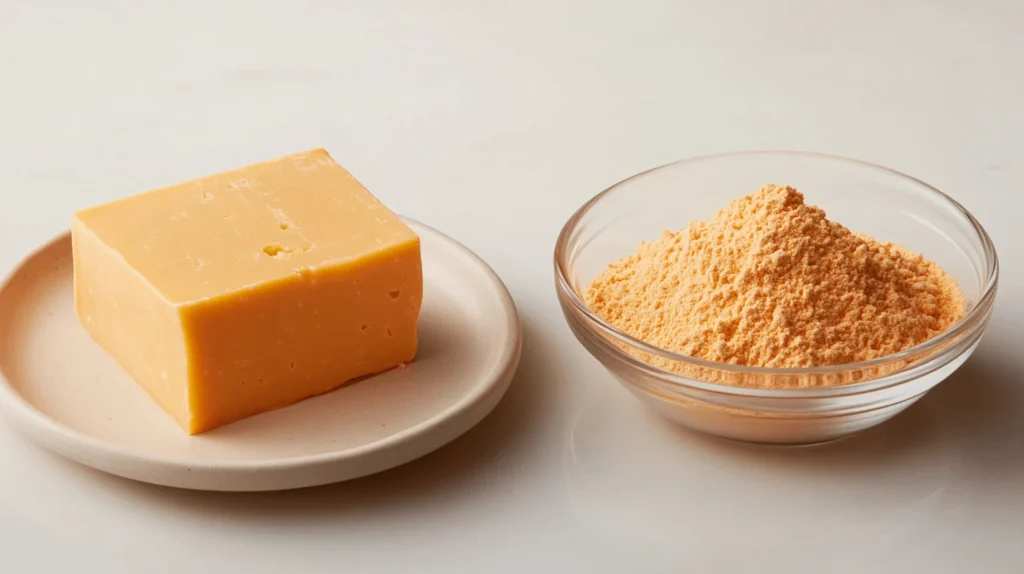In recent years, people have been increasingly asking, “Can I use cheese powder instead of cheese?” Whether for convenience or to extend the shelf life of cheese, this product has become a popular alternative. It offers a quick solution for adding a cheesy flavor to various dishes. In this article, we will discuss its characteristics, nutritional value, and its potential as a substitute for real cheese in cooking. By the end, you’ll know when and how to use it in place of regular cheese.
What is Cheese Powder?
Defining Cheese Powder
Cheese powder is a finely ground product derived from cheese. It undergoes a dehydration process that removes moisture while retaining its flavors. The result is a concentrated, dry form that captures the essence, making it easy to store and use in a variety of recipes. For example, you can explore its use in scalloped potatoes for a cheesy twist.
How Cheese Powder is Made
To make it, manufacturers dry out cheese through methods like spray-drying or freeze-drying. This process preserves the intense flavor and aroma of the cheese but removes the moisture, making it easier to store for extended periods. The final product, which is typically a fine powder, can be sprinkled on food or incorporated into dishes.
Different Types of Cheese Powder Available
Several varieties are available, including:
- Cheddar: This type is the most popular and widely used, offering a sharp, tangy flavor.
- Parmesan: Often used in Italian dishes, it adds a nutty, salty flavor.
- American: Known for its mild, creamy taste, it is often used in processed snacks.
- Gouda and Swiss: These offer a smoky or nutty profile, perfect for unique flavor pairings.
Discover more about its versatility through creative recipe ideas for scalloped potatoes.
The Nutritional Comparison: Cheese vs. Cheese Powder

Nutritional Value of Cheese
Cheese provides essential nutrients such as protein, calcium, vitamin A, and B12. It’s rich in fats, which can contribute to its creamy texture and satisfying mouthfeel. However, cheese also contains a significant number of calories, which might concern those looking to manage their intake.
Nutritional Value of Cheese Powder
It offers a more concentrated flavor but contains fewer calories than real varieties because it lacks moisture. While it retains many of the same flavors, it may not have the same nutrient density. The drying process can lead to a reduction in vitamins and minerals compared to fresh options.
Key Differences in Fat, Protein, and Carbohydrates
- Fat: It has a higher fat concentration per serving due to its lack of moisture.
- Protein: Cheese, particularly hard cheeses like cheddar, provides more protein.
- Carbohydrates: Both are low in carbohydrates. This may have a slightly higher carb content due to additives used during processing.
These differences are important to keep in mind when considering which form of cheese best fits your dietary goals.en considering which form of cheese best fits your dietary goals.
The Taste Profile: Cheese Powder vs. Cheese
Does Cheese Powder Have the Same Flavor as Real Cheese?
While it replicates the flavor of real varieties, the experience is not identical. The product provides an intense, concentrated flavor, but it can taste more artificial compared to fresh options. Nevertheless, it still delivers that familiar tang, which makes it a valuable ingredient in many recipes.
How Cheese Powder Enhances Dishes
It enhances dishes by adding a rich, savory flavor, transforming ordinary foods into something extraordinary. There’s no need for refrigeration or melting, which makes it convenient. Commonly, it is used in popcorn, chips, sauces, and even seasoning mixes, offering a quick way to elevate the taste.
The Impact of Cheese Powder on Texture and Mouthfeel
Although it adds flavor, it lacks the creamy texture that fresh cheese provides. Therefore, it doesn’t work well in dishes that require cheese to melt or create a smooth, creamy texture. However, in dry applications, it can provide a delightful cheese flavor that complements the dish’s overall mouthfeel.
Benefits of Using Cheese Powder
Convenience and Shelf Life
It offers unmatched convenience. Unlike fresh cheese, which requires refrigeration and has a short shelf life, it remains stable at room temperature for months. Its long shelf life makes it a perfect pantry staple for those who want to have cheese flavor on hand without the need for frequent trips to the store.
Cost-Effectiveness
Compared to fresh cheese, it is often more affordable, especially in bulk. Since you only need a small amount to achieve a strong flavor, it can be a cost-effective alternative for many recipes. Additionally, it doesn’t spoil as quickly, allowing for long-term savings.
Versatility in Cooking
It is incredibly versatile. You can use it in a variety of recipes, including savory snacks, sauces, pasta dishes, and even baked goods. Its ability to dissolve easily into liquids or sprinkle onto dry foods makes it a go-to ingredient for creating cheese-flavored dishes without the need for melting cheese.
Can I Use Cheese Powder Instead of Cheese in Cooking?
Substituting Cheese Powder for Cheese in Recipes
Yes, You can substitute it for the ingredient in certain recipes. However, keep in mind that it is not a perfect replacement for every dish. It is most effective when you want to add cheese flavor without the texture of melted cheese. For inspiration, you can learn about Paula Deen’s scalloped potato techniques, which creatively incorporate cheese powder.
When to Use Cheese Powder as a Cheese Substitute
You should use it when you want to add flavor rather than texture. It works well in:
- Snacks: Perfect for seasoning popcorn, chips, and crackers.
- Sauces and dips: You can stir it into sauces or cheese dips to add flavor quickly.
- Seasonings and rubs: It works well in dry rubs for meats, enhancing their flavor without adding moisture.
However, for dishes that require melted cheese or a creamy texture, you may want to stick with fresh cheese.
Recipes That Benefit from Cheese Powder Substitution
It can be a great addition to several recipes, especially those that are quick to prepare and don’t rely on the melting properties of cheese. Some great options include:
- Popcorn: A classic combination of cheese and popcorn creates a savory snack.
- Mac and cheese: You can use it as a shortcut to create a quick mac and cheese sauce.
- Cheese-flavored crackers: Adds the perfect seasoning to homemade or store-bought crackers.
These dishes benefit from the intense flavor without requiring the texture of fresh cheese.

Practical Considerations for Using Cheese Powder
How to Use Cheese Powder in Different Dishes
When using it, be sure to start with small amounts and adjust according to taste. A little goes a long way since it is concentrated. Add it to dry snacks, sprinkle over popcorn, or mix it into sauces and dips for a savory boost.
Ideal Amounts for Substitution
Typically, you can substitute 1 tablespoon for each ounce of the ingredient. However, this ratio may vary depending on the recipe. Always taste as you go and adjust the amount to match your preferred flavor intensity.
Common Mistakes to Avoid When Using Cheese Powder
- Using too much: It is highly concentrated, so it’s easy to overpower your dish if you add too much. Start small and taste before adding more.
- Relying on it for texture: It lacks the creaminess of fresh varieties, so it’s not a substitute in dishes that require a melted texture.
Cheese Powder in Popular Recipes
Snack Foods (Popcorn, Chips, etc.)
Cheese powder is most commonly used in snacks like popcorn, chips, and crackers. Its ability to evenly coat dry foods makes it an ideal seasoning for these crunchy snacks.
Sauces and Dips
Works wonderfully in sauces and dips. It dissolves easily in liquids and can give your dips a creamy, cheesy flavor without the need for actual cheese. Stir it into queso, cheese dips, or even salad dressings for a quick fix.
Baked Goods
Can be incorporated into baked goods to add flavor. It is particularly effective in savory recipes like crackers, breads, and muffins, where it enhances the overall taste without affecting the texture.

Does Cheese Powder Offer the Same Health Benefits as Cheese?
Comparing the Health Benefits of Real Cheese vs. Cheese Powder
Offers a rich nutrient profile with protein, calcium, and essential vitamins, whereas it lacks many of these nutrients due to the dehydration process. If you’re seeking a more nutrient-dense option, real cheese is the better choice.
Calcium, Protein, and Other Nutrients
Both can provide calcium and protein, but cheese offers these nutrients in higher quantities. It is often lower in essential vitamins and minerals, making it a less nutritious choice overall.
Potential Drawbacks
While it can provide a convenient and flavorful alternative to real cheese, it is not as nutrient-dense. Relying on it too frequently may result in missing out on some of the essential nutrients found in fresh cheese, such as vitamin A and B12.
The Best Cheese Powder Substitutes
Alternative Cheese Powders: Are They Better?
There are many alternatives to traditional varieties, such as Parmesan or Gouda, that can offer different flavors. These options can work better in specific dishes where you want to change up the flavor profile.
Dairy-Free Options
For individuals who avoid dairy, dairy-free alternatives are available. These plant-based options mimic the flavor of cheese without the dairy, making them suitable for vegan or lactose-intolerant diets.
The Future of Cheese in Cooking
Innovation in Products
As the demand for convenience and flavor grows, manufacturers are innovating new products. These include organic, plant-based, and flavored varieties that cater to different dietary needs and preferences.
How It’s Transforming Kitchens
It has revolutionized how we incorporate cheese into cooking. It offers a quick, shelf-stable option that allows chefs and home cooks to experiment with new dishes and flavors. As its popularity increases, it will likely become a staple ingredient in kitchens around the world.
FAQs
Can I use cheese powder in place of cheese in all recipes?
It works best in recipes where the primary role is to provide flavor, rather than texture. It’s ideal for dry dishes like popcorn or chips, sauces, and seasonings. However, it may not work well in recipes that require melting or a creamy consistency, such as pizza, grilled sandwiches, or lasagna.
How much cheese powder should I use to replace real cheese?
The general guideline is to use about 1 tablespoon for every ounce of the ingredient. However, this can vary based on the recipe and personal taste preferences. Start with a small amount and adjust according to the desired flavor intensity.
Can I use cheese powder in baking?
Yes, it can be used in baking, especially in savory dishes. It’s great for adding flavor to crackers, bread, muffins, or any baked goods that benefit from a cheesy kick. However, it doesn’t melt like fresh cheese, so use it in recipes where you want the flavor but not the texture.
What is the best cheese powder for cooking?
Cheddar is the most popular and versatile for many recipes. However, depending on your taste or the specific dish, you may also prefer Parmesan, Gouda, or other varieties. Each type has a distinct flavor, so choose one that complements your dish.
Is cheese powder healthier than regular cheese?
It tends to be lower in calories than real varieties because it lacks moisture, but it is less nutritious overall. While it still provides some protein and calcium, it doesn’t contain the same vitamins and minerals that fresh options do. It’s important to use it in moderation if you’re concerned about nutritional content.
Can I substitute cheese powder for fresh cheese in a sandwich or salad?
It doesn’t work well as a substitute for fresh varieties in a sandwich or salad. The creamy texture and moisture that fresh options provide are essential for these types of dishes. Instead, it is better suited for dry applications, such as seasoning popcorn or mixing into sauces.
Can I use cheese powder in sauces and dips?
Absolutely! It dissolves easily into liquids, making it a great addition to sauces and dips. It can quickly provide a cheesy flavor for dishes like queso, cheese dips, or even creamy pasta sauces.
Does cheese powder contain any preservatives?
Many cheese powders do contain preservatives to extend shelf life and maintain flavor. It’s important to check the label for additives, especially if you prefer products without artificial ingredients.
Is cheese powder suitable for vegans?
Most cheese powders are dairy-based, so they are not suitable for vegans. However, there are plant-based cheese powders available that are made with ingredients like nuts or soy. These options can provide a similar cheesy flavor without the dairy.
How long does cheese powder last?
It has a long shelf life compared to fresh varieties. When stored in a cool, dry place, it can last for several months or even up to a year, depending on the brand and packaging. Always check the expiration date to ensure the best flavor.
Conclusion
Cheese powder offers a highly convenient and cost-effective alternative to real in a variety of recipes.It stands out for its ability to deliver a rich,intense flavor without the need for refrigeration, making it ideal for long-term storage. While it may not replace fresh in every application, particularly in dishes that require the texture, creaminess, or meltability of real, it excels in dry preparations. It enhances the taste of snacks such as popcorn, chips, and crackers, as well as sauces, soups, and seasonings.
By understanding how to properly incorporate it into your cooking, whether as a topping, a flavoring agent, or an ingredient in baked goods, you can unlock its full potential and add a burst of goodness to a wide range of dishes.

